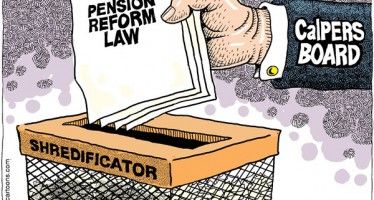Cuts Ahead For State's Many Regulations
Katy Grimes: California leads the country in regulatory laws. It’s nothing to be proud of. While other states mock California’s businesses representatives at national industry meetings for the crazy laws and regulations, California’s businesses owners and employees are paying the price with business and job losses.
Tired of temporary fixes, Sen. Sam Blakeslee and representatives from the Assembly and Senate formed the E3 Roundtable in an effort to achieve meaningful, structural regulatory reform.
Yesterday the E3 held its first meeting of the new year and invited several representatives of the business community to speak about the burden of overregulation, and the impediments to doing business in the state.
Blakeslee said the goal is not to prohibit regulations, but to reform the process in which rules and regulations are developed so that regulations better achieve the intended objectives, in a well-designed manner that is also protective of jobs and the state’s economy.
According to Loren Kaye, a Little Hoover Commissioner, California has failed to use set practices of rule making when developing regulations. Because there are no standard of protocols, agencies are developing their own regulatory standards, with no economic analysis used in the process to determine cost effectiveness.
John Kabateck, the National Federation of Independent Business Executive Director, said that 97 percent of all employers in the state are small business owners. And last year, according to Kabateck, 400,000 small businesses closed down in the state, not just due to the tough economy, but because of strangling regulations.
Kabateck said that it costs small businesses more than $48.00 per hour to pay for California regulations, and most businesses don’t even know when additional regulations have been imposed until an inspector shows up at the business, or they receive a violation notice in the mail.
“There is a need for establishing the costs of regulations,” said Bob Raymer, of the California Building Industry Association, “and whether proposed regulations will have an impact on business.”
Raymer said that regulations used to pay for themselves, and California needs to get back to that practice. Currently, instead of acknowledging that businesses are faltering under the weight of regulations, state government continues to impose more and more regulations.
According to Raymer, AB 32 and the push to limit greenhouse gas emissions is one law that is hurting businesses in the state. “The California Energy Commission is currently seeking to economically qualify more GHG regulations on a per house basis.”
Dave Puglia with the Western Growers said that 90 percent of the fresh produce in the west comes from California and Arizona. “California farmers are the most heavily regulated in the world,” said Puglia. And while other California businesses are moving out of the state, California farms can’t move, but the farmers can, and they do move elsewhere to run farms.
The regulations restricting farmers are actually preventing them from making a profit in the state. “It used to be that 80 percent of a farmers’ time was spent on farming and 20 percent on managing regulations. Now its the other way around, Puglia said.
Blakeslee said the group would be meeting several times in the next few weeks, to continue the research. “We don’t need more regulations – we need smart regulations.”
FEB. 8, 2011
Related Articles
Fracking in CA
Our colleague Chris Reed has written an article on fracking: Fixing California: Will fracking bonanza be allowed? And here’s a
Don’t trust Covered California’s latest round of happy talk
While the national media increasingly seem to have figured out that Obamacare is a farce, its California version continues to
CalPERS’ $100K club increases 900%
Let the good times roll! for those getting pensions from the California Public Employees Retirement System, anyway. The Register reported:




